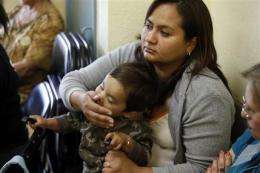Hospitals, doctors deal with swine flu jitters

(AP) -- Concerns about a possible pandemic have sent people streaming into crowded emergency rooms and walk-in clinics - not with swine flu, but the swine flu jitters.
While the situation varies greatly around the country, hospitals and clinics in California, New York, Alabama and other states are dealing with a surge in what New York City Health Commissioner Thomas Frieden said are "people who are worried, but not sick."
Coughs and sneezes that might have been ignored before the outbreak emerged are now a reason to see a doctor.
"They're so afraid this is the killer swine flu that they want someone to look at them and test them," said Dr. John Bradley, who heads the infectious disease division at Rady Children's Hospital in San Diego.
The 261-bed pediatric care facility just north of the Mexico border is seeing up to 50 percent more patients and has increased staffing to handle them. So far, only one probable case has been found and the hospital is advising parents to take their children to their family doctor before heading to the ER.
Swine flu jitters so far have not caused widespread disruption to the health care system, but have slowed business in some facilities. And if the number of needless visits rises, health officials worry that already strained emergency rooms won't be able to handle the influx and seriously ill people won't get treatment as quickly as needed.
Earlier this week, the emergency room at Alabama's Huntsville Hospital saw 100 people more than usual in just 12 hours. Virtually all were worried about swine flu.
"When we get a deluge like this, it really distracts us from getting to a more acutely ill person in a timely manner," said Dr. Thomas Calvert, who co-directs the hospital's emergency services. "We're able to do it, but it puts an enormous amount of stress on both our doctors and nurses."
The heightened concern is not surprising given the attention being paid by the media and public health officials. The World Health Organization recently raised its pandemic alert to the second-highest level and U.S. officials have been issuing nearly constant warnings about what to look for and what to do to avoid becoming sick.
Mexico is the epicenter for the disease, with more than 150 suspected swine flu deaths. The United States has confirmed only one swine flu death: a Mexican toddler whose family had been visiting relatives in Texas. The more than 100 other confirmed cases all have been mild.
But with the disease spreading, people are worried. That's especially true among Mexican immigrants.
St. John's Well Child & Family Center, which oversees clinics that treat Los Angeles' poor and uninsured, had seen no swine flu cases as of Thursday, though doctors have seen a surge in patients complaining about flu-like symptoms.
Most were Mexican immigrants suffering nothing more than a cold, but worried they might have been exposed to the swine flu virus on a recent trip to Mexico or a visit from a relative.
At one of St. John's clinics, walk-in patients waited up to four hours to see a doctor, more than twice as long as usual, according to Jim Mangia, the center's president and chief executive officer. He said six medical assistants have been hired from a temp agency to handle the crowds.
Patients on Wednesday were screened in clinic waiting rooms and the ill were isolated in a separate exam room. Yancy Cabrera brought her 5-month-old son, worried that his night coughing could indicate swine flu.
"He's very little, so he shouldn't be coughing this much," said Cabrera, who works at the Los Angeles International Airport. "It's been going on for one month now."
People need to exercise common sense and go to the emergency room only if they truly need that level of care, said Dr. Howard Blumstein, vice president of the American Academy of Emergency Medicine.
Otherwise, he said, "It's going to overload a system that's already overloaded."
Doctors point out another reason to avoid the ER if you're not sick: It's easier to catch germs in a waiting room.
---
Associated Press Writers Amy Taxin, Solange Reyner, Juliana Barbassa in California and Sara Kugler in New York City contributed to this report.
©2009 The Associated Press. All rights reserved. This material may not be published, broadcast, rewritten or redistributed.















